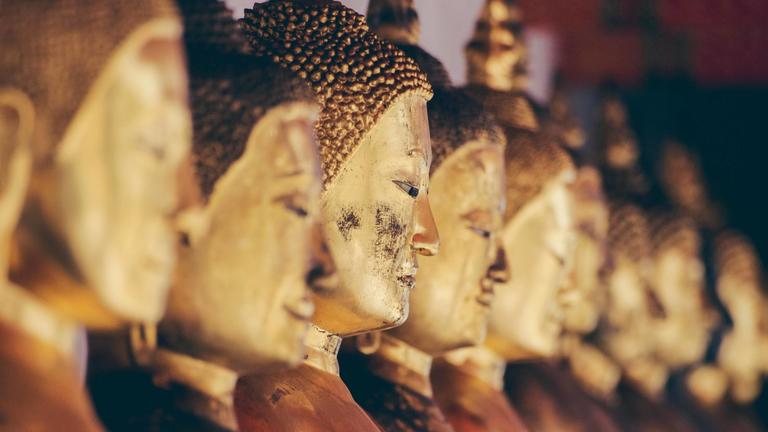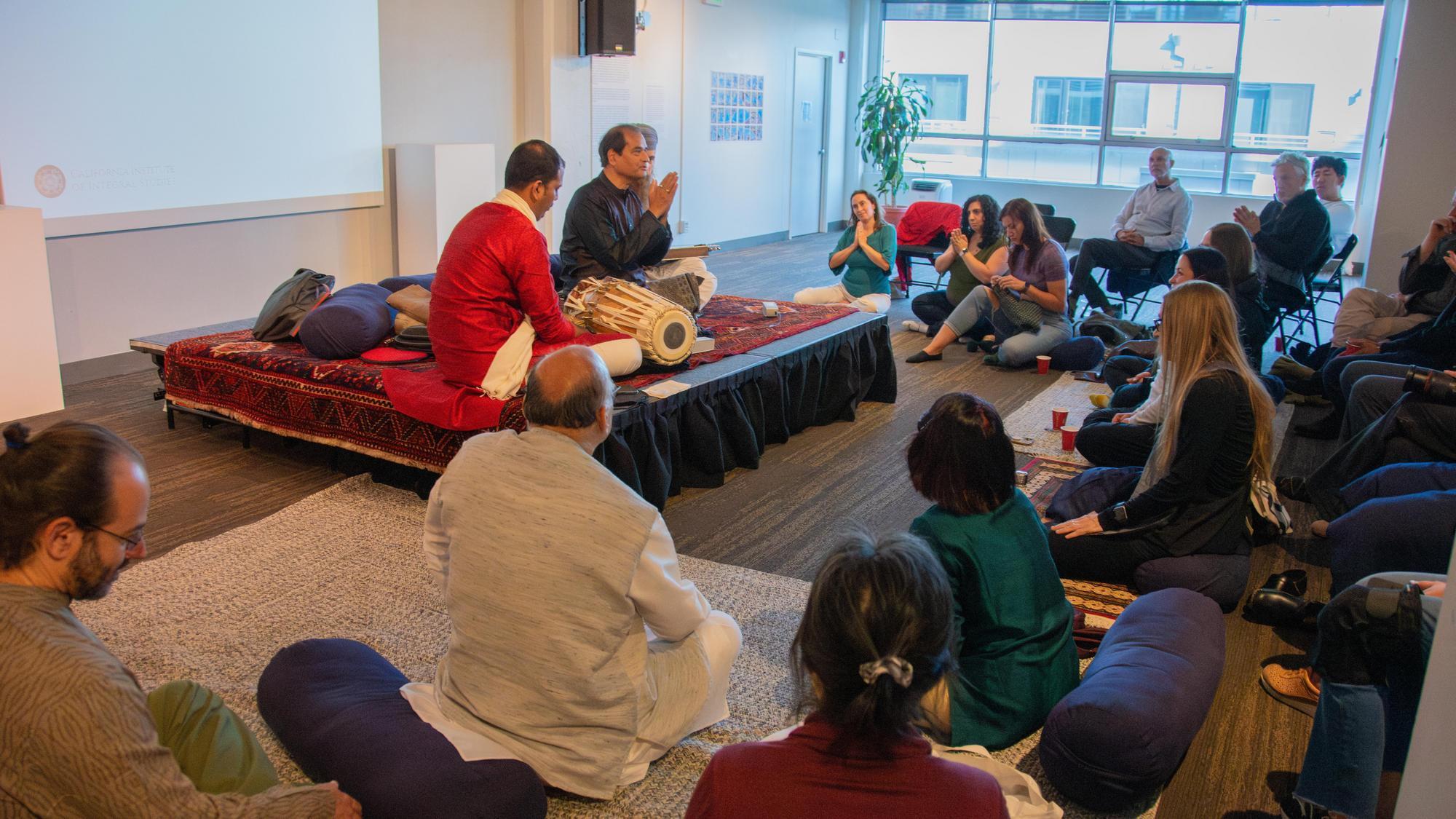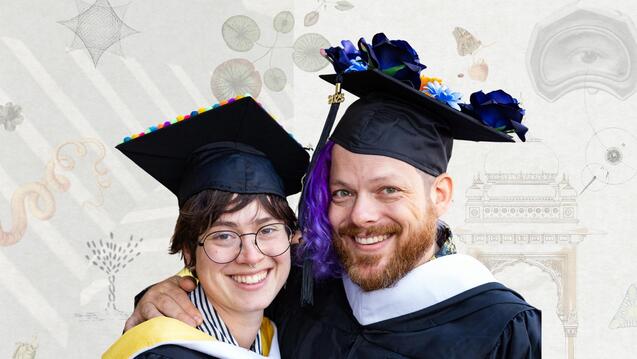
Doctor of East-West Psychology
Join a community of scholars integrating multiple ways of knowing as a catalyst for personal and societal change through our Ph.D. program.
Program Overview
Our Approach
The mission of the Ph.D. in East-West Psychology at CIIS is to explore the convergence of Eastern, Western, and Indigenous psychologies and spiritualities in the spirit of dialogue and integral inquiry. Our students engage in research subjects that explore the meaning of this convergence for a diverse, multicultural, and peaceful world.
We encourage students to build bridges between disciplines or fields of research (e.g., psychoanalysis and Buddhism), research methodologies (e.g., theoretical, phenomenological, narrative, heuristic), approaches to knowledge e.g., (using first-, second-, and third-person standpoints), and epistemologies (e.g., Eastern contemplative and Western scientific).
East-West Psychology students contribute their expertise to the expansive field of integral philosophies through original research for their dissertation. Many students use their dissertation to contribute to growing bodies of research in areas such as mindfulness, somatic spirituality, eco-psychology, Indigenous and earth-based wisdom, community-building, restorative justice, integral yoga, and non-ordinary states of consciousness.

Career Paths
Upon graduation, students are prepared for a wide variety of careers. By utilizing integral approaches and the versatile skill set conferred by our rigorous academic training, graduates find success and fulfillment as:
- Educators, researchers, and writers
- Advocates, activists, and community organizers
- Environmental stewards and eco-leaders
- Entrepreneurs and consultants
- Counselors and mental health para-professionals
- Nonprofit leaders
Curriculum
The Ph.D. in East-West Psychology at CIIS consists of 40 units of online or in-person coursework, including an introductory course with a retreat component, two comprehensive exams, proposal writing, and dissertation research. Students work closely with their advisors to design an individualized curriculum and participate in research classes designed to help articulate their dissertation research project.
Curriculum Highlights
EWP 9566 Comparative Mysticism (3 units) In the spirit of empathetic dialogue and inquiry, this doctoral seminar provides both an in-depth exploration of the field of comparative mysticism and a sustained examination of the nature of mystical phenomena. After discussing the various meanings of the term mysticism and the methodological foundations of the field of comparative mysticism research, the remainder of the class will be dedicated to reading and discussing selected mystical texts from around the world. As a part of the requirements for the course, students will present to the class on a topic within the field of comparative mysticism.
EWP-6043 Intro to Yoga Psychology (3 units) Yoga is a term with both a broad and a general meaning and a narrower and specialized meaning in the country of its origin. The West has its history of reception of the term, which has colored its meanings. In this course, we will look at the broader understanding of yoga as a pervasive Indic cosmo-psychology and an occult anatomy with its archive of practices, cultural expressions and goals related to life-choices. Taking a historical approach, we will explore the roots of yoga practice in the Indus Valley, the cosmological and psychological maps of the Vedas and Upanishads, the occult world of deities and supernaturals, the psychology of ritual, soul and reincarnation, the constitution of human nature, the psychology of knowledge, moksha and samadhi, the Gita's synthesis, the will and its uses, bhakti or devotion, the Tantric system of kundalini and the chakras; siddhis or paranormal powers, and cultural expressions influenced by these understandings. Finally, we will consider attempts at integrating these structures and processes and the utilities of yoga psychology to (post-)human potential.
EWP 6326 Chinese Body-Mind Healing Systems: An Interdisciplinary Approach (3 units) This course adopts an interdisciplinary approach drawing on Chinese philosophy and cultural history, anthropology, and psychology to the study of Chinese body-mind healing systems. We will study and analyze the basic concepts and theories of traditional Chinese medicine in its intellectual and cultural context. The course will emphasize the following components: (i) comprehensive study of fundamental concepts and theories of traditional body-mind healing systems, such as Qi, heart-mind, yin yang, five phrases, manifestations of internal organ systems, meridians, including original source materials in English translation; (ii) practice basic diagnostic skills and traditional Chinese health regimens; and (iii) critically assessing contemporary globalization and integration of traditional medicines in Western health system.
-
All classes 3 units unless otherwise specified.
I. Core Requirements—6-7 Units
EWP 6000 EWP Community Retreat (1 unit)
EWP 6001 Introduction to East-West Psychology (2 units)
EWP 6330 Knowledge Work and the Modern Academy (1 unit)Select one of the following:
EWP 6014 Civilizations in Transition: From Shadow to Soul
EWP 6034 Modernity, Colonialism, and Transcultural Hermeneutics
EWP 6114 Auroville: The City of Dawn: An Immersive Research Experience
EWP 6329 Conscious Diversity: Inner and Outer - A Diversity Process Class (2 units)
EWP 7011 Indigenous Traditions: Ancestral Consciousness and Healing
EWP 6037 Ancestral MigrationsII. Required Research Courses—3 Units
EWP 7035 Research Methods 1: Research FoundationsIII. Comprehensive Exams – 6 units (taken in last semester of course work)
EWP 6145 Comprehensive Studies: Literature Review
EWP 7036 Research Methods 2: Research LabIV. Advanced Ph.D. Seminars—6 Units
Students will take two of the following or any other advanced Ph.D. seminar that is offered:
EWP 6024 Civilization in Transition - From Shadow to Soul
EWP 6126 Jung and the Sacred
EWP 9104 Principles of Healing
EWP 9106 Contemplative Traditions and Practices
EWP 9406 Jung’s Red Book
EWP 9566 Comparative Mysticism
EWP 9009 Integral EcopsychologyV. Optional Areas of Specialization Electives—14-15 Units
Possibilities include:
Asian Psychologies
Depth Psychology
Indigenous Studies
Ecopsychology, Culture, and Psychology
Integral and Transpersonal Psychology
East-West Spiritual Counseling
Psychospiritual PracticesVI. Dissertation Seminar—3 units*
EWP 9800 Thesis/Dissertation Proposal Completion (0.1 unit)*
EWP 9900 Thesis/Dissertation Seminar (0.1 unit)*
*This will add an additional fraction of units to the 36 units of coursework
Entry Requirements
If you would like to learn more about this program, we’re here to help. Explore our program further with in-depth materials, discuss your personal and career goals at one of our open houses, or get in touch with our admissions counselors, who are ready to assist you in navigating the application process.
Required Application Materials
Your application is your opportunity to share who you are. To be considered essays and written responses must be your own authentic work.
Online Admissions Application: Begin the application process by submitting an online application and paying the nonrefundable $68 application fee.
Degree Requirement: A bachelor’s and master's degree in a discipline relevant to the program (e.g., religion, philosophy, psychology, and others) from an accredited school.
Minimum GPA: A GPA of 3.0 or higher in previous coursework is required. However, a GPA below 3.0 does not automatically disqualify an applicant and CIIS will consider a prospective student whose GPA is between 2.0 and 3.0. These individuals are required to submit a GPA Statement and are encouraged to contact the Office of Admissions to discuss their options.
Transcripts: Official transcripts from all accredited academic institutions attended where 7 or more credits have been earned. Transcripts may be sent digitally to materials@ciis.edu or mailed to CIIS in their official, sealed envelope. Transcripts from institutions outside the U.S. or Canada require a foreign credit evaluation through World Education Services (WES). CIIS will also accept foreign credential evaluations that are in a comprehensive course-by-course format from the current members of the National Association of Credential Evaluation Services (NACES).
Admissions Essay: A five-to-seven page (typed, double-spaced) essay that answers the following:
- What life experience, values, emotional/spiritual insights, and aspirations have led you to apply to East-West Psychology?
- What are your educational, personal, and professional goals and objectives?
Academic Writing Sample: A piece of original academic writing of 2,000–4,000 words (eight to ten pages typed, double-spaced) meant to demonstrate the ability to express ideas and evaluate and critique existing scholarship in a chosen area. A sample that uses outside sources must include proper citations.
Two Letters of Recommendation: Letters of recommendation will be accepted from academic advisors, professors, professional supervisors, or someone able to attest to your ability to undertake the work required for your program. Recommenders should use standard business format and include full contact information-name, email, phone number, and mailing address.
Events and Info Sessions
A Conference Celebrating C.G. Jung’s 150th Birthday at CIIS
An online event with Admissions Counselors Skylar Hall and Ronda Sharp
Attend our in-person event on January 31 or online event on February 21.



Take the Next Step
For over 50 years, CIIS has been at the forefront of education that integrates rigorous science, innovative scholarship, and social justice. You will learn from faculty at the forefront of their fields, local artists and activists, and a community of peers as passionate and dedicated as you. There’s never been a better time to be here – let’s build a healthier and more equitable world.




